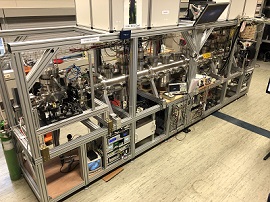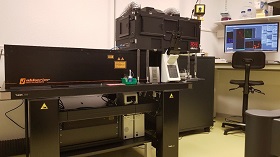Open Competition Science-M grant for three FSE researchers
Three FSE researchers have been awarded an Open Competition Science-M grant by the Dutch Research Council (NWO). Anastasia Borschevsky and Steven Hoekstra (both Van Swinderen Institute) together receive an M2 grant of EUR 700,000 for their project ‘Probing Particle Physics with Polyatomic molecules’. Rifka Vlijm (Zernike Institute) receives an M1 grant of EUR 350,000 for her project ‘Filming cell division using AI’.
M-grants are intended for innovative, high quality, fundamental research and / or studies involving matters of scientific urgency.
Prof. Anastasia Borschevsky & Prof. Steven Hoekstra | Probing Particle Physics with Polyatomic molecules

This joint theory-experiment small-scale project aims to address big questions in particle physics. Previously, precision measurements have used diatomic molecules to test the discrete symmetries at the basis of particle physics. The project of Borschevsky and Hoekstra studies more complex molecules - up to seven atoms. These molecules are promising because of their high sensitivity to symmetry violations and their resilience to systematic errors in the measurements. Ultimately, these molecules will be used to probe the electron's electric dipole moment - a predicted asymmetry of the electron that is connected to the poorly understood observed matter-antimatter asymmetry in the Universe.
Dr. Rifka Vlijm | Filming cell division using AI

During cell division, each daughter cell should receive exactly one DNA copy. Microtubules divide the two DNA copies by pulling on them. Therefore, which microtubule binds to which DNA molecule is crucial. How the protein complex called corona organizes this binding remains a mystery as it is too small and dynamic to be detected by ordinary microscopes. Vlijm solves this by imaging fixed cells in low- and high-resolution using a super-resolution-microscope. Next, low-resolution movies in living cells – this is faster and less damaging – are translated into super-resolution using AI, to finally film how the corona ensures robust genome inheritance.
NWO Open Competition Domain Science-M
M-grants are intended for realizing curiosity-driven, fundamental research of high quality and / or scientific urgency. The grant offers researchers the possibility to elaborate creative and risky ideas and to realise scientific innovations that can form the basis for the research themes of the future.
More news
-
14 January 2026
What the smell of the sea does to the clouds above Antarctica
